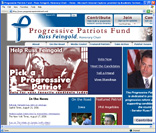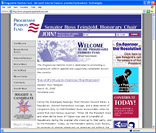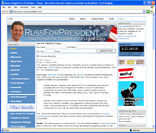


www.progressivepatriotsfund.com
(Aug. 22, 2006 grab)
www.russforpresident.com
(March 31, 2006 grab)
| In Brief - Elected to the U.S. Senate in Nov. 1992, re-elected in 1998 and 2004. Elected to the Wisconsin State Senate in 1982, re-elected in 1986 and 1990. Attorney at Foley & Lardner and La Follette & Sinykin in Madison, WI, 1979-85. J.D. Harvard University Law School, 1979; Rhodes Scholar, 1977; B.A. University of Wisconsin-Madison, 1975. Born March 2, 1953 in Janesville, WI. [Timeline]. |
Notes
Progressive Hope Opts
for Senate Role
Sen. Russ Feingold had considered
a 2004 campaign for president, doing some national travel in 2001, but
in March 2003 he ruled out a White House bid in order to focus on his re-election
campaign. This time, looking at 2008, Feingold appeared more likely
to run. In mid-January 2005 he formed a leadership PAC, the Progressive
Patriots Fund, and he did substantial national travel visiting 17 states,
including several visits to Iowa and New Hampshire. Feingold's positions
on issues such as the USA PATRIOT Act, Iraq, censure of President Bush,
and gay marriage earned him early support among liberal and progressive
Democrats. For example, in Spring 2006 people in 15 states had already
set up blogs or websites supporting Feingold; this was more activity than
for any other 2008 prospect and recalled the grassroots support that bolstered
Howard Dean in the early stages of the 2004 campaign (>).
Among these supporters was Dan Kuehnert, who started a Feingold blog in
December 2004 writing, "I believe he would make the best president -- and
that's what really matters. He has courage, intelligence, and integrity
-- characteristics that are pretty rare in politicians these days, but
characteristics that are always needed in a president." Twenty three
months later Kuehnert, now a law student, was still blogging in support
of Feingold, "Because he has what it takes to not only be elected president,
but to be a great president." However, on November 12, 2006, in a
letter
to friends and supporters, Feingold announced that he would not run.
"I'm sure a campaign for President would have been a great adventure and
helpful in advancing a progressive agenda," Feingold wrote. "At this
time, however, I believe I can best advance that progressive agenda as
a Senator with significant seniority in the new Senate serving on the Foreign
Relations, Intelligence, Judiciary and Budget Committees."
Campaign Finance Reform
Sen. Russ Feingold first
made his name in the U.S. Senate through his work on campaign finance reform.
In September 1995, as a freshman Senator, he signed on as an original co-sponsor
of Sen. John McCain's (R-AZ) Campaign Finance Reform Act of 1995.
Over the next six and a half years McCain-Feingold would become synonymous
with campaign finance reform. Congress finally passed the the Bipartisan
Campaign Reform Act (BCRA) in March 2002, and on March 27 President Bush
quietly signed the bill into law.
Maverick
Feingold has earned a reputation
as an independent and a maverick and perhaps no action epitomizes that
more than his lone vote against the USA PATRIOT ACT on October 25, 2001.
This was less than two months after the September 11 terrorist attack.
In his floor statement Feingold expressed concerns with numerous provisions
of the anti-terrorism bill and said, "Yet we must examine every item that
is proposed in response to these events to be sure we are not rewarding
these terrorists and weakening ourselves by giving up the cherished freedoms
that they seek to destroy." The roll call vote was 98 to 1.
There have been other instances where Feingold has taken an independent
course. In early 2001 he was one of eight Democratic Senators to
support confirmation of John Ashcroft as Attorney General. In September
2005, he was one of 22 Democrats to support the nomination of John Roberts
at Chief Justice of the Supreme Court.
More recently, to the discomfort of some of his Democratic colleagues in the Senate, on March 13, 2006 Feingold introduced S.Res. 398, a resolution to censure President Bush on the grounds that he "has authorized and continues to authorize wiretaps by the National Security Agency of Americans within the United States without obtaining the court orders required by the Foreign Intelligence Surveillance Act of 1978," "has failed to inform the full congressional intelligence committees about this program," and "repeatedly misled the public." In a March 12 statement RNC Press Secretary Tracey Schmitt said, "Attempting to harness angry partisanship for short-term political gain does nothing to make America safer and everything to detract from President Bush's continued efforts to aggressively fight the War on Terror. Not only is Senator Feingold's approach a disservice to those who work tirelessly to protect America, it sends the wrong message to our enemies.” The next day the RNC sent out a briefing headlined "Meet Grandstanding Sen. Russ Feingold (D-WI): Will Democrats Stand With Feingold's Soft On Terror Crusade?" After a month the resolution had attracted just two co-sponsors, Sens. Tom Harkin (D-IA) and Barbara Boxer (D-CA).
A Leading Voice Against
the War in Iraq
In his October 9, 2002 floor
statement on the resolution authorizing the use of force against Iraq,
Feingold said, "Both in terms of the justifications for an invasion and
in terms of the mission and the plan for the invasion...the Administration's
arguments just don't add up. They don't add up to a coherent basis
for a new major war in the middle of our current challenging fight against
the terrorism of al Qaeda and related organizations." He was one
of 23 Senators to vote against the resolution.
In the months and years that followed (>) Feingold has continued to raise questions about the Administration's handling of Iraq. In June 2005 he sponsored a resolution calling on the President to submit "a clear plan and time frame for United States military operations in Iraq." Finally, on August 18, 2005 he proposed the complete removal of U.S. troops from Iraq by December 31, 2006, becoming the first Senator to take such a bold step (>). White House spokesperson Dana Perino responded, "The President believes that setting an artificial timetable would send the wrong message to the Iraqis, who need to know that we are not going to leave before completing the mission. It would also send the wrong message to our troops. We are serious about completing the mission, and they need to know that they have our full support. And it would send the wrong message to the enemy, who, as the President has said many times, would just then have to wait us out." Feingold has continued to advance the December 31 date; in April 2006 he introduced an amendment to the emergency supplemental appropriations bill, H.R.4939, which states, "The United States shall redeploy U.S. forces from Iraq by December 31st, 2006, maintaining only a minimal force sufficient for engaging directly in targeted counter-terrorism activities, training Iraqi security forces, and protecting U.S. infrastructure and personnel."
Fiscal Responsibility
In a humorous TV spot from
Feingold's 2004 re-election campaign, his daughter Ellen asks, "What does
it mean to have your Senator on the Concord Coalition’s Honor Roll for
four straight years? To me it means my dad is cheap. But to
this non-partisan group that rates every Senator on fiscal responsibility,
it means he’s among the top two budget hawks. So I guess he’s tight
with money at work too." Indeed, Feingold's biography notes that
he is "a ten-time winner of the Concord Coalition's deficit hawk award."
He has for years advocated pay-as-you-go (paygo) rules, which would require
new entitlement spending or tax cuts to be paid for with offsetting budget
cuts or new revenues. He has also objected to the Administration's
policy of paying for the war in Iraq through emergency supplemental bills.
Back in March 2003, a week before the start of the war, he proposed an
amendment to the Budget Resolution to create a reserve fund of $100 billion
to pay for possible military action and reconstruction in Iraq.
Wisconsin
For Feingold it begins with
Wisconsin. In his first campaign for U.S. Senate in 1992 he famously
painted a contract with the people of Wisconsin on his garage doors in
Middleton: "1. I will rely on Wisconsin citizens for most of my contributions.
2. I will live in Middleton, Wisconsin. My children will go to school
here and I will spend most of my time here in Wisconsin. 3. I will
accept no pay raise during my six-year term in office." Feingold
has held town hall meetings in every one of Wisconsin's 72 counties each
year since he was sworn in as a U.S. Senator. He will hold his 1,000th
listening session in the latter part of 2006.
Wisconsin boasts a long progressive tradition featuring such figures as Robert "Fighting Bob" La Follette (1,2), who won about 5 million votes (17%) in the 1924 presidential election as the candidate of the United States Progressive Party, and Gaylord Nelson, founder of Earth Day, but the state has not produced a president. In the last two presidential campaigns Wisconsin has been among the most closely contested states, resulting in narrow Democratic victories (0.38 percentage points in 2004 and 0.22 percentage points in 2000).
National Potential
As to how Feingold might
have fared in a national campaign, the charge was made that he is too liberal,
and the fact that he is Jewish and twice divorced could have seriously
hampered his chances. Alternatively, with his independent personna
and record of fiscal responsibility, the Senator from the heartland could
have been a strong nominee. Certainly Republicans would have had
a difficult time painting him as a big-spending liberal. Feingold's
support for gay marriage could have become an issue. Wisconsin voters
faced a constitutional amendment to ban gay marriage on the November 2006
ballot. At one of his listening sessions in early April 2006 Feingold
came out squarely against the measure. He argued that, “Denying people
this basic American right is the kind of discrimination that has no place
in our laws, especially in a progressive state like Wisconsin." And
while Republicans portrayed his positions on the USA PATRIOT Act and Iraq
as "sending the wrong message to our enemies" and being "soft on terror,"
Feingold was consistent and reasoned in his views and could not be portrayed
as a flip-flopper.
Speeches
Rockingham County Democrats'
first annual Eleanor Roosevelt Covered Dish Dinner at Epping, Sept. 30,
2005. [transcript]
Readings and Articles
Frank Bures. "Person
of the Year: Russ Feingold is Listening." Madison.
November 2006 (cover story).
John Powers. "Man
of the Moment." Vogue. February 2006.
Michael Crowley. "Withdrawal
Symptoms." The New Republic. November 21, 2005 (cover
story).
also note:
Sanford Horwitt working
on a biography of Sen. Feingold to be published by Simon & Schuster
in 2007, possibly in late Spring or early Summer. Horwitt wrote Let
Them Call Me Rebel, a biography of Saul Alinsky (Knopf, 1989).
He also penned a favorable column: "Edwards? Clinton? Nah,
2008 could be Russ Feingold's year." Chicago Tribune, March
20, 2005.
Photos
June
14, 2006-Campaign for America's Future's "Take Back America" Conference.
May
19, 2006-Speaking on "Beyond Iraq: Refocusing Our National Security
Strategy" at the Center for Strategic & International Studies.
April
28-29, 2006-First trip to Iowa, including Cedar Rapids and Johnston.
[Loebsack
for Congress, Boswell for Congress]
March
12, 2006-After an appearance on ABC News' "This Week."
Sept.
30-Oct. 1, 2005-The Senator's 2005 visit to New Hampshire, including
Manchester, Concord, Epping and Hanover. [Progressive
Patriots Fund]
On the Web
 |
 |
 |
More | |
| Progressive Patriots Fund
(Official Site)
www.progressivepatriotsfund.com (Aug. 22, 2006 grab) |
(March 31, 2006 grab) | Unofficial Site
www.russforpresident.com (March 31, 2006 grab) |
| Copyright © 2004, 2005, 2006 Eric M. Appleman/Democracy in Action |  |